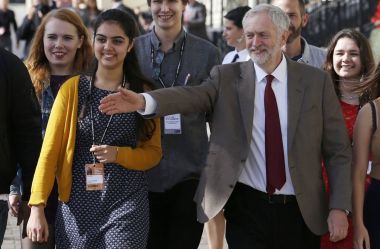Corbyn: Government favours the rich and fawns on oppressors

The new leader of the Labour party accused the government on Tuesday of favouring the rich and squandering the country's weight in global affairs by offering "fawning support" to foreign governments which crush democratic rights.
Just four months since Labour suffered a heavy defeat at Britain's last national election, Jeremy Corbyn used his first conference speech as party leader to call on the party to unite.
In a speech that some said was short on policy ideas, he played to his supporters by saying he wanted to usher in a new, kinder politics and to boost investment in the economy so more people could thrive.
Corbyn, elected earlier this month on a pledge to shake up the political system, said as leader he had a mandate for change: "First and foremost it's a vote for change in the way we do politics...Politics that's kinder, more inclusive."
He pledged to listen to the thousands of new members who have joined Labour since he ran for leader, many of them younger voters disillusioned with establishment politics, and said he would challenge the government's austerity policies.
"Labour will be challenging austerity, it will be unapologetic about reforming our economy to challenge inequality and to protect workers better," he told delegates who halted his hour-long speech at least twice with standing ovations.
"You don't have to take what you're given," he told the party's annual conference in the southern English city of Brighton.
Threat
But his analysis of the economy – that growth was based on a house price-fuelled asset bubble – was criticised by the head of an employers' group.
"We share Labour's aim of ensuring the benefits of growth are spread more evenly across the UK, but we don't recognise Mr Corbyn's characterisation of the economy," said John Cridland, director-general of the Confederation of British Industry.
"While there's still more to do on exports, the recovery is more balanced than Mr Corbyn argues."
Several business leaders have taken aim at Labour under Corbyn, saying the appointment of John McDonnell, a man who has listed the overthrow of capitalism among his interests, as his would-be Chancellor underlined a move too far to the left.
Justice Secretary Michael Gove of the ruling Conservatives said in a statement: "Labour have confirmed that they are a threat to our national security, our economic security and to the security of every family in Britain."
But Corbyn said his team would make sure policy was geared towards helping the majority, rather than pandering to the few.
He called on Prime Minister David Cameron to review its approach to governments that "abuse their own citizens".
"Nor does it help our national security to give such fawning and uncritical support to regimes – I mention only two but there are many I could mention – such as Saudi Arabia and Bahrain," Corbyn said.
His speech was welcomed by his supporters, who said he was a refreshing change for a party tired of modern-day politics of slogans and soundbites.
"Wow. I was absolutely blown away," said Elaine Tiffin, a former nurse from Brighton who joined the Labour Party the day after Labour's election defeat in May.
"He is so genuine, he is an honest man."
But the prospect of rifts in a party where many – not least among its MPs – do not share all of Corbyn's left-leaning priorities hung over the occasion.
Corbyn made clear he wanted to scrap the renewal of Britain's nuclear-armed Trident submarine fleet, but he offered debate on one of the party's most divisive issues.
Some fear his pledge to "listen to everyone" may plunge the party into a never-ending debate.
Berni Millam, a former nurse and Labour Party member, said the party did not want divisions.
"Life is all about compromise...to keep the balance of the party both sides will have to compromise to deliver what the Labour Party is all about," she said.











